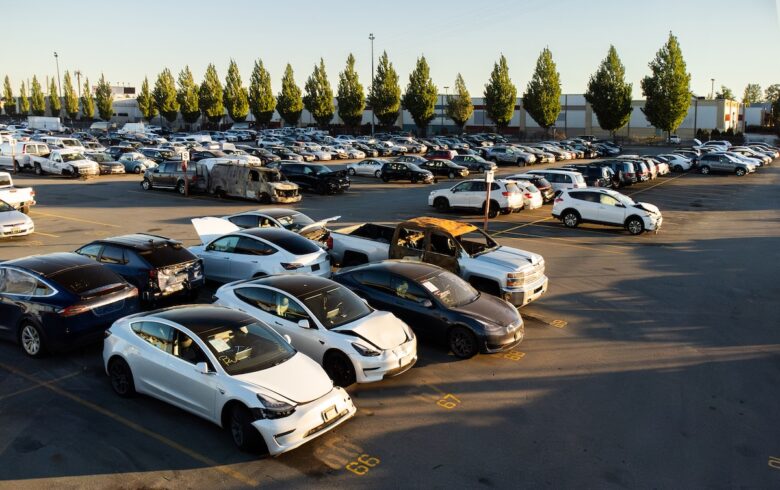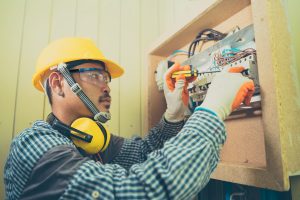The emergence of electric vehicles (EVs) signifies a pivotal shift in the automotive sector, underscored by the adoption of clean energy and a commitment to sustainability. This change is increasingly evident in Abbotsford, Canada, where EVs are becoming more common. In light of this trend, it’s vital to assess both the environmental implications of EV proliferation and the specific challenges and prospects associated with the recycling of EV batteries. This blog aims to delve into the prospects of EV battery recycling in Abbotsford, examining the existing recycling infrastructure and what the future holds for this essential component of eco-friendly transportation. Additionally, we will highlight the role of Abbotsford scrap car removal services in facilitating the recycling process, ensuring that the transition to electric vehicles remains aligned with environmental sustainability goals.
The Rise of Electric Vehicles (EVs) in Abbotsford
The demand for electric vehicles in Abbotsford and across Canada has been steadily increasing over the last few years. As people become more environmentally conscious, they are gravitating towards EVs as an alternative to traditional combustion engine vehicles. With the government’s commitment to clean energy and sustainable transport, the rise of EVs is expected to continue in the years to come.
How EVs are Changing the Automotive Landscape
The shift towards electric vehicles is not just a trend; it represents a fundamental change in the automotive landscape. As more people embrace the benefits of electric vehicles, manufacturers are responding by investing in new technologies and innovative designs. This shift towards clean energy vehicles aligns with Canada’s commitment to reducing greenhouse gas emissions and promoting sustainable transportation. With advancements in electric vehicle technology, the future of mobility is being shaped by electric vehicles, marking a new era in the automotive industry.
The rising popularity of EVs is also influencing consumer preferences, leading to an increased demand for new vehicles that are powered by clean energy. This shift in consumer mindset is driving the adoption of EVs and encouraging automakers to focus on developing electric vehicles as part of their product lineup.
READ ALSO: Why Install a Sub Panel in Abbotsford?
The Shift Toward Sustainable Transport
The transition towards sustainable transport is a key motivation behind the growing popularity of electric vehicles in Abbotsford and beyond. With the environmental impact of traditional vehicles becoming increasingly evident, consumers are seeking greener alternatives. Electric vehicles, with their zero tailpipe emissions, offer a compelling solution to reduce carbon footprints and promote sustainable transportation.
Not only do electric vehicles have lower emissions, but they also have the potential to drive changes throughout the entire supply chain. From manufacturing to battery recycling, the electric vehicle industry offers opportunities for a more sustainable and environmentally friendly approach to transportation. By embracing electric vehicles, communities like Abbotsford can contribute to the development of a more sustainable future.
The Challenges of EV Recycling
While electric vehicles bring enormous environmental benefits, they also pose significant challenges when it comes to recycling. The complex nature of electric cars, particularly their batteries, requires specialized recycling processes to safely extract valuable materials while minimizing environmental impact. Addressing these challenges is crucial to ensure the sustainable growth of the electric vehicle industry and maintain a circular economy.
Dismantling Electric Cars: A Complex Process
Dismantling electric cars for recycling purposes is a complex process that involves the disassembly of intricate components and systems. Unlike traditional vehicles, electric cars contain advanced technologies, including high-voltage battery packs, electric drivetrains, and electronics. These components require specialized knowledge and equipment to safely dismantle and recycle.
The process of recycling electric cars involves separating materials, such as metals and plastics, that can be reused or repurposed. Additionally, valuable materials, including lithium, nickel, and copper, can be extracted from electric car batteries. Proper dismantling and recycling of electric cars are crucial to maximize resource recovery and minimize the environmental impact of automotive waste.
Battery Disposal: The Main Challenge
One of the main challenges in electric vehicle recycling is the proper disposal of EV batteries. These batteries contain valuable materials, such as lithium, nickel, and copper, which can be recovered and reused. However, improper disposal can lead to environmental contamination. Key points to consider include:
- Safe disposal methods for lithium-ion batteries are essential to prevent environmental pollution.
- Recycling and repurposing batteries offer opportunities for material recovery.
- Recovery of materials, such as lithium, nickel, and copper, helps reduce reliance on mining.
- Proper battery disposal and recycling contribute to a sustainable circular economy.
The Issue of Rare Material Recovery
Apart from battery disposal, another challenge in electric vehicle recycling is the recovery of rare materials and critical minerals. Electric vehicle batteries, particularly those used in long-range EVs, contain rare materials like cobalt, lithium, nickel, and copper, which are vital for battery performance. Effective recovery and recycling of these materials can reduce the demand for mining and promote sustainability. Some key considerations include:
- Developing efficient recycling processes is crucial for recovering critical minerals from electric vehicle batteries.
- Recovering rare materials from EV batteries reduces reliance on new mining projects.
- Promoting recycling initiatives for critical minerals mitigates environmental impacts associated with mining.
- Investing in research and development can lead to innovative solutions for rare material recovery.
The Opportunities in EV Recycling
While electric vehicle recycling poses challenges, it also presents significant opportunities for environmental and economic benefits. Recycling electric vehicle batteries can drive the development of a circular economy, promoting resource efficiency and reducing waste. Additionally, the recovery of critical materials from EV batteries opens new avenues for sustainability and material supply.
Creating a Circular Economy: Repurposing EV Batteries
Repurposing electric vehicle batteries plays a critical role in creating a circular economy, where resources are recycled and reused, minimizing waste. Some key points to consider include:
- Repurposing EV batteries for energy storage reduces the demand for new battery materials.
- The repurposing of batteries for secondary applications, like home energy storage, extends their lifecycle.
- Battery recycling and repurposing contribute to the development of a sustainable battery materials supply chain.
- The circular economy approach supports environmental sustainability and resource efficiency.
Rare Material Recovery: A New Opportunity for Recyclers
The recovery of critical materials, such as nickel and copper, from electric vehicle batteries presents new opportunities for recyclers. Consider the following:
- Developing methods for recovering critical minerals from EV batteries enhances resource efficiency.
- Recovering rare materials promotes environmental sustainability and reduces dependence on mining.
- The recycling industry can play a vital role in establishing a sustainable supply chain for critical minerals.
- The growth of electric vehicle recycling fosters new economic prospects and environmental benefits.
The Role of Innovation and Technology
To overcome the challenges of EV recycling and capitalize on its opportunities, innovation and technology play a crucial role. Some considerations include:
- Advancements in recycling technologies and processes can enhance the efficiency and sustainability of EV recycling.
- Innovative solutions, such as automated dismantling and material separation, improve recycling yields.
- Technology-driven advancements enable the recovery of valuable materials from electric vehicle batteries.
- Investment in research and development drives innovation, contributing to more sustainable battery recycling.
The Current State of EV Recycling in Abbotsford
In Abbotsford, recycling facilities are adapting to meet the growing demand for electric vehicle recycling services. These facilities are equipped with advanced technologies and processes to handle the unique recycling requirements of EV batteries. Consider the following:
Existing Recycling Facilities and Their Capabilities
Abbotsford boasts recycling facilities capable of handling the unique recycling requirements of electric vehicle batteries. These facilities are expanding their capabilities to optimize the recycling of electric vehicle batteries. Key points include:
- Recycling facilities in Abbotsford are equipped with specialized equipment and expertise for EV battery recycling.
- Optimizing the capabilities of existing recycling facilities supports the recycling needs of electric vehicle batteries.
- Abbotsford’s recycling facilities contribute to the development of a sustainable battery recycling ecosystem in Canada.
Government Policies and Initiatives
Government policies play a critical role in shaping the future of electric vehicle recycling in Abbotsford. Collaborating with provinces, cities and First Nations communities, the government implements initiatives to promote sustainability and recycling efforts. Some key considerations include:
- Government policies, led by Premier Eby, prioritize clean energy and sustainable transport initiatives.
- The government’s support for recycling infrastructure development fosters sustainable waste management practices.
- Collaborative efforts between governments and communities drive awareness and participation in battery recycling.
- Government initiatives are instrumental in integrating electric vehicle recycling into the broader sustainability agenda.
The Road Ahead for EV Recycling in Abbotsford
The future of electric vehicle recycling in Abbotsford is promising, with increasing demand for recycling services, future investments, and the importance of public awareness and education. As electric vehicles continue to gain popularity, recycling infrastructure, and technology will evolve, laying a strong foundation for sustainable waste management practices.
Increasing Demand for EV Recycling Services
The growing demand for electric vehicle recycling services indicates the need for expanding recycling capabilities beyond Abbotsford. Southern Ontario, including Toronto, is witnessing a surge in demand, driving investment and expansion in recycling infrastructure. Key points include:
- The increasing demand for recycling services demonstrates a commitment to responsible waste management.
- The expansion of recycling services beyond Abbotsford caters to the needs of a larger population.
- The surge in demand reflects the growing popularity of electric vehicles and the environmental awareness of communities across southern Ontario.
Future Investments and Infrastructure Development
Investments in electric vehicle recycling infrastructure and technology are vital for meeting the increasing demands of a sustainable future. Some key points to consider:
- Future investments in recycling infrastructure drive advancements in electric vehicle recycling processes.
- Infrastructure development promotes the establishment of recycling facilities capable of handling larger volumes of electric vehicle batteries.
- Investments in recycling infrastructure contribute to job creation and economic growth, supporting local communities.
- Infrastructure development complements mining projects, enabling a more sustainable approach to critical materials supply.
The Importance of Public Awareness and Education
Public awareness and education initiatives are crucial for encouraging participation and engagement in electric vehicle battery recycling. Some important considerations include:
- Educating the public about the importance of recycling batteries creates a more environmentally responsible community.
- Public awareness campaigns, via social media platforms like Twitter and Facebook, foster knowledge-sharing and environmental consciousness.
- Educational programs focused on battery recycling promote eco-consciousness and the sustainable use of resources.
- Public engagement, driven by awareness and education, plays a significant role in shaping recycling behaviors and habits.
Are We Ready for the Future of EV Recycling?
The future of electric vehicle recycling represents a transformative period for waste management, not just in Abbotsford, but across North America and globally. Consider the following:
The rising demand for electric vehicles and the environmental imperative to recycle batteries means that electric vehicle recycling will be critical in the years to come. Communities, governments, and industries must collaborate and invest in recycling infrastructure, technology, and education to create a sustainable battery recycling ecosystem.
Countries like the United States and Germany have already made significant strides in electric vehicle recycling, pioneering innovative recycling processes and materials recovery. Detroit, known as the birthplace of the automobile industry, is also embracing electric vehicle recycling as it shifts towards clean energy transportation.
As Abbotsford and Canada continue their environmental stewardship, investing in electric vehicle recycling capabilities will ensure a greener future and a circular economy approach to battery materials. The evolution of electric vehicle recycling presents an opportunity for job creation, environmental protection, and sustainable growth.
Conclusion
In conclusion, the future of EV recycling in Abbotsford holds both challenges and opportunities. As the popularity of electric vehicles continues to rise, so does the need for sustainable solutions for their end-of-life management. Dismantling electric cars and properly disposing of their batteries pose complex challenges that require innovative approaches and advanced technologies. However, there are also opportunities to create a circular economy by repurposing EV batteries and recovering rare materials. To fully realize the potential of EV recycling, investment in infrastructure and public awareness is crucial. With increased demand for EV recycling services and government initiatives supporting the industry, Abbotsford has the potential to become a leader in sustainable transport and contribute to a greener future. Let’s embrace the future of EV recycling and work towards a cleaner and more sustainable environment.



